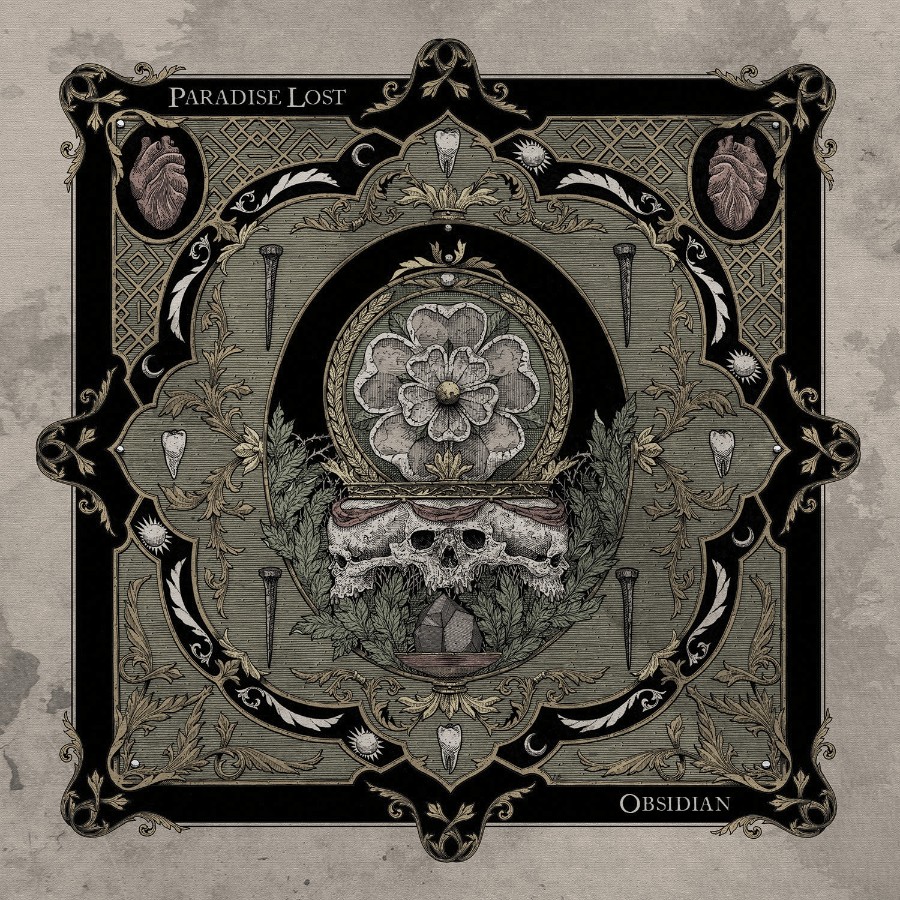I always thought gothic metal referred to blocks of iron or steel with inexplicably long black hair, bold eyeliner and a hatred of their parents; turns out my assumptions were slightly off…
Setting the record straight is Paradise Lost, a group that every metalhead and their nan knows about besides myself who simply saw a catchy name and respectable record label accreditation as good enough reason to burrow away from human interaction in my review cave; with today’s servings being Obsidian.
Obsidian is the successor to 11 other Paradise Lost records. As such, I take no shame in admitting that I didn’t listen to a single one before reviewing their latest offering, because a) there’s 11 of the damn things and this boy has to eat at some stage and b) the promo material notes that Obsidian’s tracklist plucks sounds from across Paradise Lost’s hefty discography, so I presumed I’d be able to take this leap of faith blindfolded. Strangely, I landed deeper within my own comfort zones than I expected, as gothic metal takes a fair few blood-stained pages from the archives of doom metal. This means calamitous, stately riffs that conduct their assaults at a trudging pace (the verse riff of Fall From Grace being a good example) paired with the thick, gravelling snarls of vocalist Nick Holmes; a Sunday picnic in amongst my personal playlists.
This, however, is where similarities come to an abrupt stop. Obsidian may play host to elements of doom metal but it’s by no means some sloppy cut-and-paste job with a gothic hairdo slapped on top. The LP is indulgently morose and audibly monochromatic, placing its primal focus not to any grandeur of technical ability but in its power to construct – and not to get too sappy here – a feeling. I wasn’t exactly left sobbing in a puddle of my own anguish but Paradise Lost’s euphonic breed of ghostly vocal harmonies and profound solo speech raises hairs on even the most chisel-jawed stoics. Brace yourselves because here comes a violent jerk in tone as I fear the album is going to sound flawless if I continue my path further up its rectum; let it be known, Obsidian is not perfect.
It pains me, really, as my criticisms are short but ultimately damning of the album in its totality, robbing Obsidians from being regarded as ‘great’ and, instead, settling for ‘very good’; “oh the shame”, the perfectionist cries. Most vexing of all, Obsidian can’t even keep a natural order to the ebbs and flows of its own quality. At least some of my less-favoured records start off sprinting and then proceed to plummet off a cliff, making the allegorical part of my job far easier. The album starts well enough. The initial triplet of Darker Thoughts, Fall From Grace and Ghosts is Obsidian’s zenith as it jumps from a gorgeous swelling ballad replete with bountiful string arrangements to the album’s first single with its fantastic solo (something I could praise the entire LP for) and tremendous lead work to the, surprisingly danceable, macabre number that is Ghosts.
We dip ever so slightly at The Devil Embraced. There’s some great songwriting here with plenty to feast on ‘in the moment’ but it’s not quite enough to send me running back for seconds. This is a trait echoed by Serenity and closer Ravenghast. The former is the most forgettable of all nine tracks and the latter, while undeniably crushing in its riffage, fails to recall the chills summoned by numbers like Ending Days or Hope Dies Young; an album’s aftertaste should never be bitter. I’d like to reiterate, however, that by many other band’s standards these tracks would be hailed as worthy contenders. With such strong surrounding material, however, I can’t help but feel that Obsidian had the potential to be greater.
While the low-points may sit incongruously to the heights of the albums’ greater hits, the performances provide a rigid backbone throughout. The rhythmics of Waltteri’s drums, for example, provide a perfect counter-weight to the plodding vocal melodies on Ghosts or Ending Days whilst Edmondson’s bass licks are given their due space to supplement an already well-rounded soundscape. But the album should be able to carry itself. Perhaps, if the instrumental additives, like the string and organ notes, were to be woven deeper within Obsidian’s DNA, the sense of drama could paint the album’s weaker moments a greater identity.
As it stands, however, Obsidian is still a very good album. Besides the minor hiccups, it has done more than enough to catch my attention to see what this sub-genre and, more crucially, this band has to offer within its dark and gloomy sanctum. It may not be the most wholesome of content to consume amidst these equally sullen times, but oftentimes the forthright and genuine can be of greater comfort than the duplicitous smiles of reassurance we tell ourselves to pull; probably just wrote some goth metal lyrics right there.
Rating: 7.5/10
By Alex Mace
Feature Image Credit: Nuclear Blast


